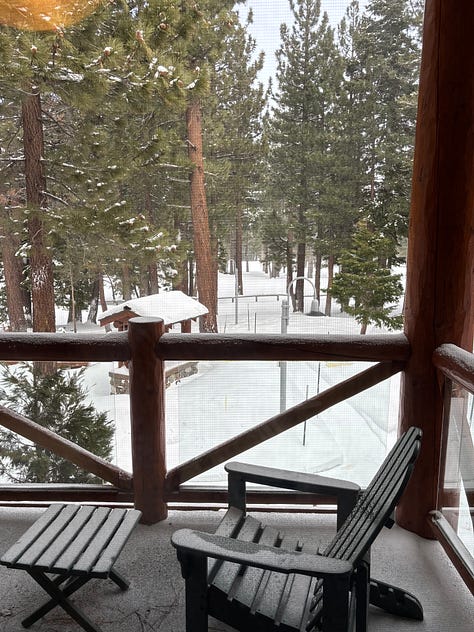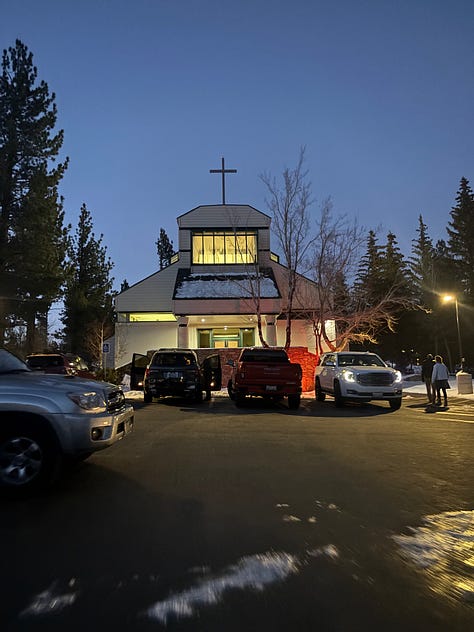I’m back on the road for a couple weeks. I’ll probably write more about that in the next Substack or two, so this one’s more about some of what I’m reading right now. That’s part of Stephen King’s first rule for writing, after all: Read. A lot.
And there are no Waffle Houses along this trip’s path, so if you’re the praying kind, send ‘em up, please and thank you.
I’m reading The Seven Storey Mountain by the most famous Trappist monk of the 20th century, Thomas Merton, and he cracks me up. That’s not to say I think he’s a clown or that I’m not taking the book seriously; I don’t, and I am. His prose is beautiful and engaging, lofty but accessible, and he’s a narrator and protagonist you want to root for. So no, I wouldn’t say I’m anywhere near laughing at him, but I can’t help but crack a smile every so often while reading his autobiography. I’m reading and he’ll say something and it’ll make me smile, that’s all.
I think this has to do with something about me someone recently put into words. “You aren’t so serious,” they said. I don’t disagree! I think it is my reading as a less-than-serious reader and Merton writing as a more-than-serious writer that makes for a unique and positive intellectual collaboration.
Sometimes he is intentionally humorous, and very wittily so, like when he describes his grandparents:
[They] were like most other Americans. They were Protestants, but you could never find out precisely what kind of Protestants they were.
Or when he said:
Why should anybody want to go to France? I thought: which shows that I was a very stupid and ignorant child.
Or when he recounted the time he was the passenger of a driver who decided to chase down a rabbit with his car:
“We’ll get him on the hill,” exclaimed the driver. “Rabbits can’t run down-hill, their hind legs are too long.” The rabbit ahead of us was doing a fine job of running down-hill, just about five feet ahead of our front wheels.
Hilarious. No notes.
What else cracks me up? Merton writes some pretty severely melodramatic reflections on, as he expresses it, the unfortunate state of the 20th century Catholic and of the world en masse. I would not say his observations are necessarily wrong or inaccurate; he is, as all good writers are, a more than capable observer of the world around him, and he hits the nail on the head every time. What makes me smile while reading is when he swings the hammer with a bit of a flourish.
Same, Thomas, same.
Whether it’s a popular opinion or a hot take to describe the Trappist of Trappists as melodramatic, I don’t know or care. I’m comfortable to share this particular opinion because it really does take one to know one, and as a fellow melodramatic, his own melodramatic tendencies only endear me to him more and more.
Some examples. Italics added for emphasis.
On top of the hill was a little chapel, now abandoned, called Le Calvaire, and indeed up the rocky path through the vineyards behind our land there had once been a series of shrines, making the fourteen Stations of the Cross between the town and the top of the hill. But that kind of piety had died away in the nineteenth century: there were not enough good Catholics left to keep it alive.
He describes France:
This land was long wild with heresy, and with the fake mysticism that tore men away from the Church and from the Sacraments, and sent them into hiding to fight their way to some strange, suicidal nirvana.
He describes society’s moral decline and the hypocrisy of some Catholics:
Is it any wonder that there can be no peace in a world where everything possible is done to guarantee that the youth of every nation will grow up absolutely without moral and religious discipline, and without the shadow of an interior life, or of that spirituality and charity and faith which alone can safeguard the treaties and agreements made by governments? And Catholics, thousands of Catholics everywhere, have the consummate audacity to weep and complain because God does not hear their prayers for peace, when they have neglected not only His will, but the ordinary dictates of natural reason and prudence, and let their children grow up according to the standards of a civilization of hyenas.
Like I said, he is not necessarily wrong or inaccurate! just melodramatic, and I love it.
Merton is critical of the world, almost excessively so, but he is as critical, if not more so, of himself as he is the world around him. I admire that he doesn’t refrain from indulging himself in criticism of what he views as wrong and abhorrent and that he persists in regarding himself as lowest among low.
It is only from that vantage point that his criticisms can mean anything at all.
He relinquishes whatever power he has over the world around him, and any sense of pride or self worth is not presented as such but as enormous, lifelong gratitude for a God and a faith that saves him, not the other way around.
He does not seem to be the most optimistic about anything other than God. Which, with eyes set on the world at large, is not unfair. (Mind you, I am only about twenty percent through the book. Perhaps his perspective will evolve, but I get the sense that he is narrating the story from the place he gets to at the end of it.)
In a world like ours, maybe God is all for which a religious person can truly hold any consistent hope. That might sound a bit pessimistic, but I don’t think it is. Pessimistic would be holding onto nothing at all and trusting the world to nothing and to no one, not to humans and certainly not to a God.
As cynical and melodramatic as he can sound, Thomas Merton’s hope and optimism is never truly lost, not when the center of his spiritual and writing lives is his love for God, the love he receives in turn, and this same love he finds in people around him, people who walk among the “hyenas.” Where I’m at in the book, he finds it primarily in the love of his parents, whose (lack of) religiosity he explains and forgives beautifully; in the love of his little brother; and in the love of near-strangers, such as M. and Mme. Privat.
He writes about the Privats:
It is a great pleasure for me to remember such good and kind people and to talk about them, although I no longer possess any details about them. I just remember their kindness and goodness to me, and their peacefulness and their utter simplicity. They inspired real reverence, and I think, in a way, they were certainly saints. And they were saints in that most effective and telling way: sanctified by leading ordinary lives in a completely supernatural manner, sanctified by obscurity, by usual skills, by common tasks, by routine, but skills, tasks, routine which received a supernatural form from grace within, and from the habitual union of their souls with God in deep faith and charity. Their farm, their family, and their Church were all that occupied these good souls; and their lives were full.
Merton is harsh, critical, sometimes even mean; he is full of high expectations and great disappointments; and he sees God’s love in the world relentlessly.
I’m reading The Seven Storey Mountain on my Kindle—which, however you feel about Amazon, has been a superb investment—so I only get to read a little at a time before going to bed while on the road. Not that I’m in a rush. I’m enjoying my time with Merton, and I’m happy to spend it with him. I’m happy to keep cracking a smile at him, with him, and dreaming of a day when a reader will do the same with me.
I recently rewatched Mike Flanagan’s The Haunting of Hill House, a Netflix show loosely adapted from the Shirley Jackson book. Like Flanagan’s other shows, Hill House offers profound spiritual insights among its episodes of family drama and supernatural supernormal spooks. This line from the last episode is a good one for so many reasons, but it struck me as Mertonesque. If we imagine Merton hearing God say this to him, I think it captures his worldview pretty well.
I loved you completely. And you loved me the same. That's all. The rest is confetti.
Which isn’t to say we can’t bemoan the consummate audacity of the confetti.






Favorite parts about being back on the road:
Audiobooks (listening to The Hobbit, read by Andy Serkis)
New music (stream “Abracadabra” by Lady Gaga")
Coffee shops
Cowboy Coffee, Independence, CA
Stellar Brew, Mammoth Lakes, CA
Monasteries visited:
Prince of Peace Abbey, Oceanside, CA
Grand total: 20 of 75




Wonderful post—and laughing lovingly at our foibles (and others!) is therapeutic as we ask God for the grace of wisdom and strength to live rightly. And thanks for the quote on the world’s hyenas that seem especially ferocious now—their laughter is without love. May He deliver us from evil.
Oh, Joseph Larson, be assured...I absolutely cracked many smiles while reading this as well as all your other writings. So, Yeehaw.